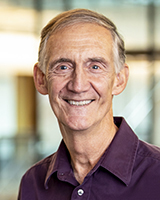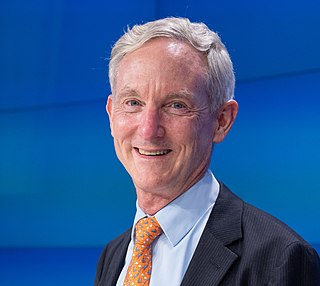
Frank Thomson "Tom" Leighton is the CEO of Akamai Technologies, the company he co-founded with the late Daniel Lewin in 1998. As one of the world's preeminent authorities on algorithms for network applications and cybersecurity, Dr. Leighton discovered a solution to free up web congestion using applied mathematics and distributed computing.

David A. Bader is a Distinguished Professor and Director of the Institute for Data Science at the New Jersey Institute of Technology. Previously, he served as the Chair of the Georgia Institute of Technology School of Computational Science & Engineering, where he was also a founding professor, and the executive director of High-Performance Computing at the Georgia Tech College of Computing. In 2007, he was named the first director of the Sony Toshiba IBM Center of Competence for the Cell Processor at Georgia Tech.

Sankar Kumar Pal is a computer scientist and the President of the Indian Statistical Institute (ISI), Kolkata. He is also a National Science Chair, Government of India. Prof. Pal is a computer scientist with an international reputation on pattern recognition, image processing, fuzzy neural network, rough fuzzy hybridization, soft computing, granular mining, and machine intelligence. He pioneered the development of fuzzy set theory, and neuro-fuzzy and rough-fuzzy computing for uncertainty modelling with demonstration in pattern recognition, image processing, machine learning, knowledge-based systems and data mining. Prof. Pal is widely recognized across the world for his pioneering and extraordinary contributions in Machine Intelligence, Fuzzy Logic, Soft Computing and Pattern Recognition. This has made India a leader in these disciplines in international scenario. He founded the Machine Intelligence Unit in 1993, and the Center for Soft Computing Research: A National Facility in 2004, both at the ISI. In the process he has created many renowned scientists out of his doctoral students.

Clayton Daniel Mote Jr. is the President Emeritus of the National Academy of Engineering. He served as the president of the NAE from July 2013 to June 2019. He also served as President of the University of Maryland, College Park from September 1998 until August 2010. From 1967 to 1991, Mote was a professor in mechanical engineering at the University of California, Berkeley, and served as Vice Chancellor at Berkeley from 1991 to 1998. Mote is a judge for the Queen Elizabeth Prize for Engineering.
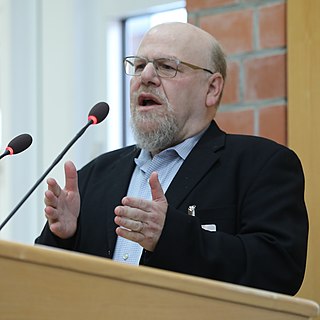
James Alexander Hendler is an artificial intelligence researcher at Rensselaer Polytechnic Institute, United States, and one of the originators of the Semantic Web. He is a Fellow of the National Academy of Public Administration.

The President's Council of Advisors on Science and Technology (PCAST) is a council, chartered in each administration with a broad mandate to advise the president of the United States on science and technology. The current PCAST was established by Executive Order 13226 on September 30, 2001, by George W. Bush, was re-chartered by Barack Obama's April 21, 2010, Executive Order 13539, by Donald Trump's October 22, 2019, Executive Order 13895, and by Joe Biden's February 1, 2021, Executive Order 14007.
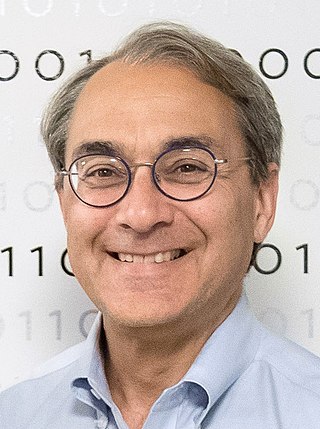
Alfred Zalmon Spector is an American computer scientist and research manager. He is a visiting scholar in the MIT EECS Department and was previously CTO of Two Sigma Investments. Before that, he was Vice President of Research and Special Initiatives at Google.

Jacek M. Zurada is a Polish engineer who serves as a Professor of Electrical and Computer Engineering Department at the University of Louisville, Kentucky. His M.S. and Ph.D. degrees are from Politechnika Gdaṅska ranked as #1 among Polish universities of technology. He has held visiting appointments at Swiss Federal Institute of Technology, Zurich, Princeton, Northeastern, Auburn, and at overseas universities in Australia, Chile, China, France, Germany, Hong Kong, Italy, Japan, Poland, Singapore, Spain, and South Africa. He is a Life Fellow of IEEE and a Fellow of International Neural Networks Society and Doctor Honoris Causa of Czestochowa Institute of Technology, Poland.
Christine L. Borgman is a distinguished Professor and Presidential Chair in Information Studies at UCLA. She is the author of more than 200 publications in the fields of information studies, computer science, and communication. Two of her sole-authored monographs, Scholarship in the Digital Age: Information, Infrastructure, and the Internet and From Gutenberg to the Global Information Infrastructure: Access to Information in a Networked World, have won the Best Information Science Book of the Year award from the American Society for Information Science and Technology. She is a lead investigator for the Center for Embedded Networked Sensing (CENS), a National Science Foundation Science and Technology Center, where she conducts data practices research. She chaired the Task Force on Cyberlearning for the NSF, whose report, Fostering Learning in the Networked World, was released in July 2008. Prof. Borgman is a Fellow of the American Association for the Advancement of Science (AAAS), a Legacy Laureate of the University of Pittsburgh, and is the 2011 recipient of the Paul Evan Peters Award from the Coalition for Networked Information, Association for Research Libraries, and EDUCAUSE. The award recognizes notable, lasting achievements in the creation and innovative use of information resources and services that advance scholarship and intellectual productivity through communication networks. She is also the 2011 recipient of the Research in Information Science Award from the American Association of Information Science and Technology. In 2013, she became a fellow of the Association for Computing Machinery.
Kanianthra Mani Chandy is the Simon Ramo Professor of Computer Science at the California Institute of Technology (Caltech). He has been the Executive Officer of the Computer Science Department twice, and he has been a professor at Caltech since 1989. He also served as Chair of the Division of Engineering and Applied Science at the California Institute of Technology.
Jonathan Shields Turner is a senior professor of Computer Science in the School of Engineering and Applied Science at Washington University in St. Louis. His research interests include the design and analysis of high performance routers and switching systems, extensible communication networks via overlay networks, and probabilistic performance of heuristic algorithms for NP-complete problems.

Annie Antón is an academic and researcher in the fields of computer science, mathematical logic, and bioinformatics.
Professor Benjamin Wan-Sang Wah is the Wei Lun Professor of Computer Science and Engineering at the Chinese University of Hong Kong, as well as the former provost of this university. He was elected President of IEEE Computer Society in 2001.
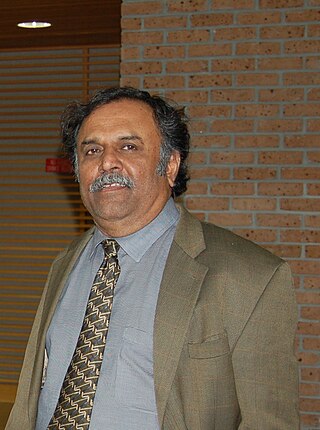
Sundaraja Sitharama Iyengar is an Indian-born American computer scientist and the Distinguished University Professor, Ryder Professor and Director of Computer Science at Florida International University, Miami, Florida, USA. He also founded and directs the Robotics Research Laboratory at Louisiana State University (LSU). He has been a visiting professor or scientist at Oak Ridge National Laboratory, Jet Propulsion Laboratory, Naval Research Laboratory, and has been awarded the Satish Dhawan Visiting Chaired Professorship at the Indian Institute of Science, the Homi Bhaba Visiting Chaired Professor (IGCAR), and a professorship at the University of Paris (Sorbonne).

Francine Berman is an American computer scientist, and a leader in digital data preservation and cyber-infrastructure. In 2009, she was the inaugural recipient of the IEEE/ACM-CS Ken Kennedy Award "for her influential leadership in the design, development and deployment of national-scale cyberinfrastructure, her inspiring work as a teacher and mentor, and her exemplary service to the high performance community". In 2004, Business Week called her the "reigning teraflop queen".

Darrell Don Earl Long is an American computer scientist and computer engineer who is the inaugural holder of the Kumar Malavalli Endowed Chair of Storage Systems Research and Distinguished Professor Emeritus of Engineering at the University of California, Santa Cruz. He was editor-in-chief of the IEEE Letters of the Computer Society and was editor-in-chief of the ACM Transactions on Storage (TOS). In 2002, he was the founder of the Conference on File and Storage Technologies (FAST).
Venkata Narayana Padmanabhan is a computer scientist and principal researcher at Microsoft Research India. He is known for his research in networked and mobile systems. He is an elected fellow of the Indian National Academy of Engineering, Institute of Electrical and Electronics Engineers and the Association for Computing Machinery. The Council of Scientific and Industrial Research, the apex agency of the Government of India for scientific research, awarded him the Shanti Swarup Bhatnagar Prize for Science and Technology, one of the highest Indian science awards for his contributions to Engineering Sciences in 2016.

Ruth Margaret Davis was an American computer scientist and civil servant who was associated with several major US government research projects. She served as deputy undersecretary of defense for research and advance technology, as assistant secretary of energy for resource applications, and as chair of The Aerospace Corporation.
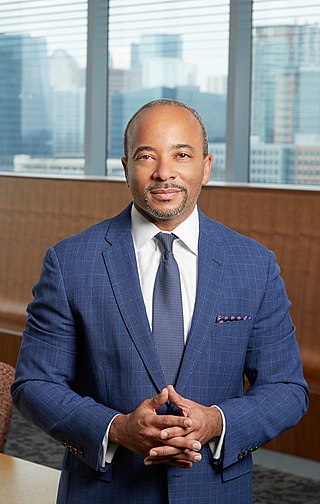
Raheem Beyah is an American computer engineer, researcher, and educator. As of January 15, 2021 he is the Dean of the College of Engineering and Southern Company Chair at the Georgia Institute of Technology. Prior to becoming the Dean, he was the vice president for Interdisciplinary Research and the Motorola Foundation Professor and the executive director of Georgia Tech's online masters in cyber security program. Beyah is also the co-founder and chair of industrial security company Fortiphyd Logic, Inc.
Shashi Shekhar is a leading scholar of spatial computing, spatial data science, and Geographic Information Systems (GIS). Contributions include scalable roadmap storage methods and algorithms for eco-routing, evacuation route planning, and spatial pattern mining, along with an Encyclopedia of GIS, a Spatial Databases textbook, and a spatial computing book for professionals. Currently, he is serving as a McKnight Distinguished University Professor, a Distinguished University Teaching Professor, ADC Chair and an Associate Director of the College of Science and Engineering Data Science Initiative at the University of Minnesota.
